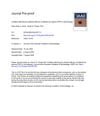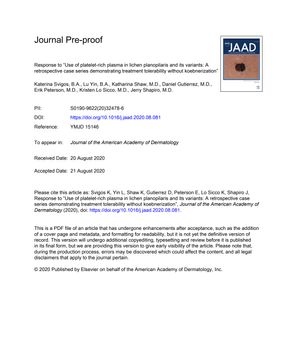TLDR The authors concluded that PRP injections were not significantly effective for treating lichen planopilaris and its variants and should not be used as the only treatment.
The authors of the document responded to Sharun et al.'s comments on their research letter regarding the use of platelet-rich plasma (PRP) in lichen planopilaris (LPP) and its variants. They provided additional details about their PRP protocol, which involves obtaining 8-16 mL of whole blood, centrifuging it to yield 5-10 mL of PRP, and administering 50-100 injections across the affected scalp. The authors agreed that variability in PRP procedures could affect efficacy and concluded that while koebnerization was not observed in their patient cohort, PRP injection therapy did not show a significant response in treating LPP and its variants. They did not recommend PRP as monotherapy for these conditions and emphasized the need for randomized controlled trials (RCTs) to truly assess the efficacy and safety of PRP injections in LPP and its variants, noting that current RCTs are mostly limited to androgenetic alopecia.
 9 citations
,
August 2020 in “Journal of The American Academy of Dermatology”
9 citations
,
August 2020 in “Journal of The American Academy of Dermatology” Many factors, like patient health and how PRP is made, can affect how well PRP therapy works in skin treatments.
 33 citations
,
July 2020 in “Journal of The American Academy of Dermatology”
33 citations
,
July 2020 in “Journal of The American Academy of Dermatology” PRP treatment improves hair density and thickness for alopecia, but needs more research.
 12 citations
,
June 2020 in “Journal of The American Academy of Dermatology”
12 citations
,
June 2020 in “Journal of The American Academy of Dermatology” Platelet-rich plasma is tolerable for lichen planopilaris and doesn't worsen the condition, but its effectiveness is unclear.
 65 citations
,
April 2020 in “International Journal of Molecular Sciences”
65 citations
,
April 2020 in “International Journal of Molecular Sciences” PRP injections may be a safe, effective alternative for hair loss treatment compared to minoxidil and finasteride.
 29 citations
,
January 2018 in “International Journal of Trichology”
29 citations
,
January 2018 in “International Journal of Trichology” PRP treatment helps hair growth and density with 70.7% success, but more research needed.
 12 citations
,
June 2020 in “Journal of The American Academy of Dermatology”
12 citations
,
June 2020 in “Journal of The American Academy of Dermatology” Platelet-rich plasma is tolerable for lichen planopilaris and doesn't worsen the condition, but its effectiveness is unclear.
 7 citations
,
August 2021 in “Journal of the European Academy of Dermatology and Venereology”
7 citations
,
August 2021 in “Journal of the European Academy of Dermatology and Venereology” Early treatment of fibrosing alopecia in a pattern distribution may improve outcomes.
 12 citations
,
June 2020 in “Dermatology and therapy”
12 citations
,
June 2020 in “Dermatology and therapy” Platelet-Rich Plasma (PRP) can promote new hair growth and increase hair density, but its effectiveness varies depending on the type of hair loss.
3 citations
,
December 2023 in “Biomedicines” PRP therapy helps skin heal and improve by promoting cell growth and repair.
 28 citations
,
August 2018 in “Dermatologic Surgery”
28 citations
,
August 2018 in “Dermatologic Surgery” Platelet-Rich Plasma (PRP) may help improve hair density in primary cicatricial alopecias (PCAs) patients, but more trials are needed to confirm its benefits.









